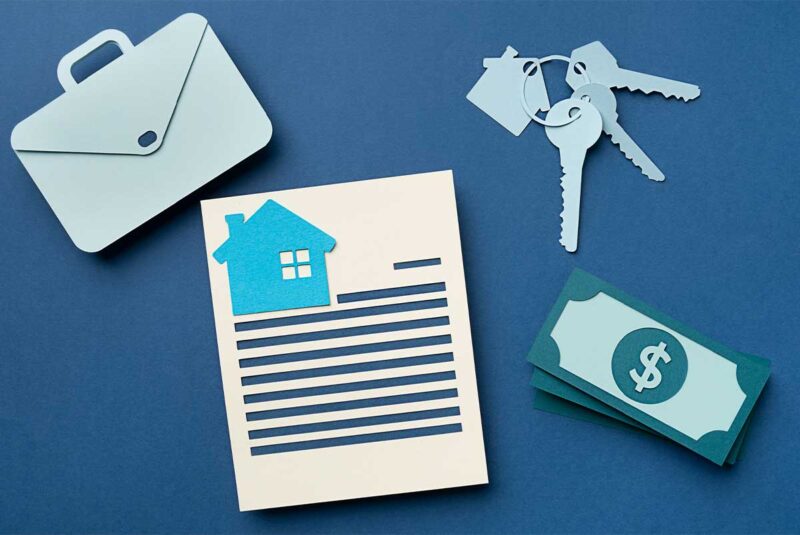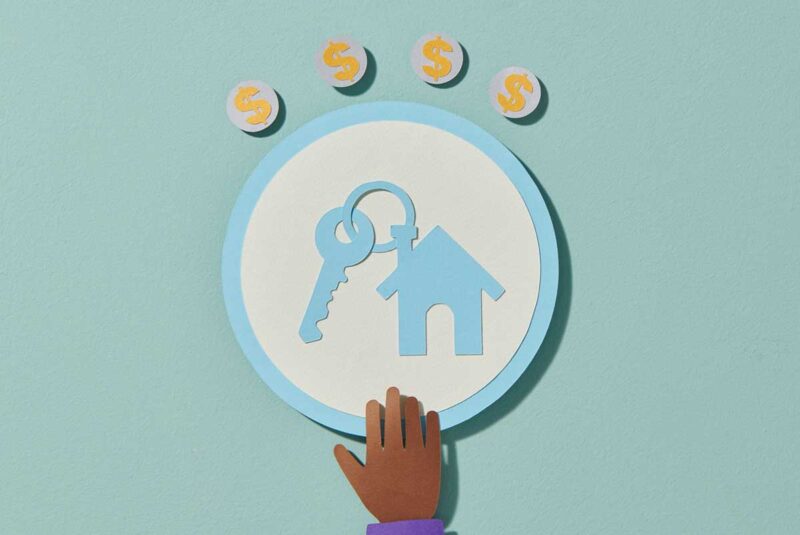Ready To Buy a Home?
Get Approved to Buy a Home
Rocket Mortgage® lets you get to house hunting sooner.
We get it, rejection never feels good. But sometimes it happens during the home loan application process.
It’s important to understand why your application was rejected during underwriting. Knowing why can improve your chances of successfully securing a mortgage on your next attempt.
So, whether your mortgage application has been denied or you’re wondering how often underwriters deny loans, we’ve got the deets on what you need to do to get your mortgage loan approved.
How Does Underwriting Work?
First off, who is an underwriter? They’re the person combing through your mortgage application to see if you qualify for the loan. They help the lender decide if they should approve or deny your application.
Underwriters are responsible for:
- Verifying your income, assets, employment, credit report, debt and confirming that you meet the requirements of the loan you applied for
- Assessing your creditworthiness (aka your reliability to pay back the loan)
- Requesting and reviewing a home appraisal to make sure the mortgage amount matches the home’s current value
The process of analyzing and verifying the information in your loan application is called the mortgage underwriting process. The process can take a few days or a few weeks, depending on your situation.
As you can see, underwriters have an important job – to make sure that you can afford the loan you’ve applied for.
At the end of the mortgage underwriting process, your loan will be approved, denied or conditionally approved. A conditional approval happens when most everything in your loan application looks good, but there are a few conditions that must be met before you can get final approval.
A loan may fall through during underwriting if an underwriter assesses your financial information and recommends the lender not give you a loan.
How Often Does an Underwriter Deny a Loan?
Having an underwriter deny a loan is not uncommon. In 2020, 9.3% of all home-purchase applications were denied. When focusing only on Federal Housing Administration (FHA) loans, 14.1% of applications in 2020 were denied, compared to 7.6% of conforming conventional loans.[1]
While most loans do get approved, mortgage underwriters do deny some loans based on different factors. It all depends on whether they think you can repay the loan. Loan approval can also vary depending on where you live and the loan type you’re applying for.
Your loan application may be denied at two different stages in the mortgage process: at the preapproval stage and leading up to closing.
Why was my loan denied at preapproval?
During preapproval, the lender is only looking at your information. They don’t have a specific home to look at yet. If you’re denied at this stage, it’s likely due to your credit score, DTI, income, employment or proof of identity.
Keep in mind that even if you are preapproved, it doesn’t always mean you’ll be approved again prior to closing.
Why was my loan denied prior to closing?
During the closing stage, the lender will look at your credit report for a second time before they grant final approval. If you acquired any new debt, opened new credit cards or made any large purchases, this could raise a red flag.
Lenders may also deny your loan at this stage because of a low home appraisal or a bad home inspection. An appraisal is mostly about determining value, but some basic safety factors get looked at. Although recommended, a home inspection typically isn’t required. However, if an appraiser suspects a pest problem or a pest inspection is required in the case of VA loans, that would be an example of a failed inspection causing issues.
Fortunately, there are plenty of steps you can take to improve your chances of being approved the next time around.
Why Was My Loan Denied?
An underwriter can deny a home loan for a multitude of reasons, including a low credit score, a change in employment status or a high debt-to-income (DTI) ratio. If they deny your loan application, legally, they have to provide you with a disclosure letter that explains why.
To improve the chances of your mortgage loan getting approved when you reapply, you’ll need to know why it was denied in the first place. So, let’s take a closer look at why some loans get denied.
Your credit score is too low
A low credit score may signal to lenders that you have trouble making payments on time or that you may not be ready to handle more financial responsibility.
Your employment status changed
If you recently changed jobs, lost a job or have been unemployed for some time, this may cause lenders to deny your loan.
Your DTI is too high
Lenders look at your DTI (fixed monthly expenses divided by gross monthly income) when qualifying you for a mortgage. If your DTI is too high, this could mean that you might have trouble covering your mortgage payments. For most conventional loans, if your DTI is above 45%, that may raise a red flag, but a DTI of up to 50% may be allowed if you have compensating factors such as a high credit score.[2]
Your loan-to-value (LTV) ratio is too high
LTV is a ratio of your mortgage balance to your home’s appraised value. The closer the mortgage balance is to the home’s value, the higher your LTV. Lenders may deny your loan if your LTV is too high.
A high LTV is likely caused by not having a lot of money upfront to use for a down payment and having to take out a larger loan.
Property problems
Your lender may deny a loan if there are major issues (like foundation damage, roof or electrical problems) discovered during an appraisal. They may request repairs before approving your loan.
Some FHA loans have government-mandated standards that the home must meet before the lender can approve a loan.[3]
Money problems
There are several things concerning money that could raise red flags and cause a lender to deny your loan, including:
- Not being able to prove that you have enough money to make your mortgage payments
- Not having enough money in your bank account to cover the closing costs, the down payment or home maintenance
- A history of missing payments on other bills, like car loans or personal loans
- Unusual bank activity, like large deposits from unknown sources (document any gift money you receive to buy a home with a gift letter)
The home appraisal is too low
If the home appraisal value is lower than the loan amount you’re applying for (aka borrowing more money than the home is worth), lenders may deny your application. You would have the option of trying to renegotiate with the seller. You may agree on the appraised value as the new purchase price or meet somewhere in between.
If you choose to pay a higher amount than the home will appraise for, you would bring the difference to the closing table along with your down payment and other closing costs.
What Should I Do if My Mortgage Loan Is Denied?
Instead of focusing on the loan denial, focus on what you can do to fix the issues that prevented your loan from getting approved.
Take a look at your disclosure letter to see why your mortgage application was denied and then take steps to improve your chances when you reapply.
Depending on the reason you were denied, we have a list of next steps you can take.
- Improve your credit score: The best way to improve your credit score is to make on-time payments. Try not to take on any more large debts and try to pay off high-interest debt ASAP.
- Have documentation: Provide your lender with proof of income and employment if you recently changed jobs, are about to change jobs or are unemployed and receive unemployment compensation. If you’re changing jobs, you’ll have a better chance of being approved if the job that you’re getting is in the same field as your current job. Lenders want to be able to determine a likelihood of employment stability, which may not be as guaranteed if you’re making a career switch.
- Lower your DTI: Pay off more debt so your DTI is lower than what’s required for the loan you want. Lowering your DTI will also help boost your credit score.
- Figure out your financing: Choose a different property that’s easier to finance or easier to save for. With a larger down payment, you’ll borrow less money and lower your LTV. A Fannie Mae HomeReady®[5] loan or Freddie Mac Home Possible®[6] loan may be a good option to get a mortgage for 3% down. You can get a loan for 3.5% down through the FHA.[7]
- Save money: Save more money for closing costs and home maintenance.
- Know your rights: The Fair Housing Act was put into place to protect people from discrimination when renting or buying a home. The guidelines will help you determine if you’ve been unfairly discriminated against.[8]
Should I wait to reapply for a loan?
There’s no hard-and-fast rule that says you have to wait a certain amount of time before you can reapply for a mortgage. But, you might want to wait a few weeks or months to give yourself time to improve your chances of getting approved.
Don’t worry about being in the shadow of past loan denials. While your credit history will show that you applied for a mortgage, it won’t show that you were denied.
Those hard credit pulls on your credit report during underwriting are common. Underwriters know that you may be shopping around for loans. It is unlikely to significantly impact your credit (and chances) for a new loan.
Minor Setback for a Major Comeback
Getting your loan application denied can feel like a major setback. And while the reasons for the loan denial are based on your financial situation, home appraisals and inspections, it’s important to remember that it’s only a minor setback, and everything is fixable.
Figure out why your loan was denied and then take the appropriate steps to stage a major comeback.
By staying in close contact with your lender during the underwriting process, providing them with any additional documentation requested and submitting proof of what you’ve fixed since your last loan application, you can improve your chances of successfully securing a mortgage!
Get approved to buy a home.
Rocket Mortgage® lets you get to house hunting sooner.
The Short Version
- While most loans do get approved, mortgage underwriters do deny some loans based on different factors. It all depends on whether they think you can repay the loan
- An underwriter can deny a home loan for a multitude of reasons, including a low credit score, a change in employment status or a high debt-to-income (DTI) ratio
- A loan may fall through during underwriting if an underwriter assesses your financial information and recommends the lender not give you a loan
Consumer Financial Protection Bureau. “Data Point: 2020 Mortgage Market Activity and Trends.” Retrieved January 2022 from https://files.consumerfinance.gov/f/documents/cfpb_2020-mortgage-market-activity-trends_report_2021-08.pdf
Fannie Mae. “Selling Guide – B3-6-02, Debt-to-Income Ratios (02/05/2020).” Retrieved January 2022 from https://selling-guide.fanniemae.com/Selling-Guide/Origination-thru-Closing/Subpart-B3-Underwriting-Borrowers/Chapter-B3-6-Liability-Assessment/1032992131/B3-6-02-Debt-to-Income-Ratios-02-05-2020.htm#DTI.20Ratios
U.S. Department of Housing and Urban Development. “4000.1 FHA Single Family Housing Policy Handbook.” Retrieved January 2022 from https://www.hud.gov/sites/dfiles/OCHCO/documents/4000.1hsgh-112021.pdf
Consumer Financial Protection Bureau. “Can a lender or broker consider whether I receive income from a public assistance program when deciding whether to give me a mortgage or home equity loan?” Retrieved January 2022 from https://www.consumerfinance.gov/ask-cfpb/can-a-lender-or-broker-consider-whether-i-receive-income-from-a-public-assistance-program-when-deciding-whether-to-give-me-a-mortgage-or-home-equity-loan-en-347/#:~:text=A%20creditor%20such%20as%20a,income%20is%20likely%20to%20continue
Fannie Mae. “HomeReady Mortgage.” Retrieved December 2021 from https://singlefamily.fanniemae.com/originating-underwriting/mortgage-products/homeready-mortgage
Freddie Mac. “Home Possible®.” Retrieved December 2021 from https://sf.freddiemac.com/working-with-us/origination-underwriting/mortgage-products/home-possible
Federal Deposit Insurance Corporation. “203(b) Mortgage Insurance Program.” January 2022 from https://www.fdic.gov/consumers/community/mortgagelending/guide/part-1-docs/203b-mortgage-insurance-program.pdf
U.S. Department of Housing and Urban Development. “HOUSING DISCRIMINATION UNDER THE FAIR HOUSING ACT.” Retrieved January 2022 from https://www.hud.gov/program_offices/fair_housing_equal_opp/fair_housing_act_overview




